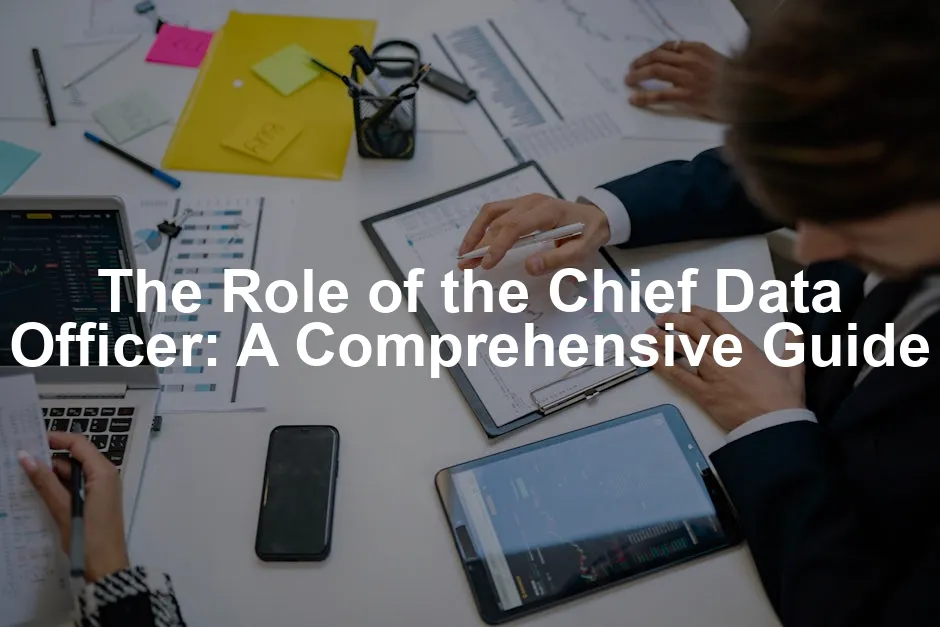Introduction
Data is crucial for modern businesses. Organizations rely on data for insightful decision-making and strategic planning. As a result, the Chief Data Officer (CDO) has emerged as a vital player in data management. This article will examine the CDO’s role, responsibilities, skills, and significance in today’s corporate landscape.
Speaking of data-driven decisions, why not equip yourself with the right tools? A Data Analytics Tool can help you visualize and analyze your data like a pro. After all, who doesn’t want to be the data wizard at their next meeting?
Summary and Overview
A Chief Data Officer (CDO) is a senior executive responsible for managing an organization’s data strategy. This role has evolved dramatically over the years. Initially focused on data management, CDOs now play a strategic role in leveraging data as a valuable asset.
Data governance, analytics, and strategy are essential in today’s business landscape. For instance, a recent study showed that 67.9% of companies appointed a CDO by 2019, a significant rise from just 12% in 2012. As the demand for data-driven decision-making increases, so does the importance of this role.
In your quest for data mastery, consider investing in a Data Management Software. It’s like having a personal assistant for your data – keeping everything organized and accessible.

The Chief Data Officer: Role and Responsibilities
What is a Chief Data Officer?
A Chief Data Officer (CDO) is a senior executive responsible for an organization’s data strategy. This role focuses on managing, analyzing, and governing data to drive business value. Unlike the Chief Information Officer (CIO), who oversees IT infrastructure, the CDO emphasizes data as a strategic asset.
The CDO’s primary functions include establishing data governance policies, ensuring data quality, and collaborating with other executives. This collaboration is crucial for aligning data initiatives with business objectives. As businesses recognize the importance of data, the CDO’s role has evolved from a technical focus to a strategic leadership position.
In today’s data-driven environment, the CDO plays a vital role in leveraging data effectively. This shift marks a significant change in how organizations view data management, reinforcing its importance across all functions. And while we’re at it, every data officer needs a comfortable office setup. Grab a premium ergonomic office chair to keep your back happy while you crunch numbers!

Key Responsibilities of a Chief Data Officer
Data Governance
Data governance frameworks are essential for managing and securing data. These frameworks outline policies and standards that ensure data is accurate and accessible. A Chief Data Officer (CDO) plays a crucial role in implementing these frameworks. They set guidelines for data usage and ensure compliance with regulations.
Data quality is paramount. Poor quality data can lead to costly mistakes. That’s why CDOs prioritize data accuracy and reliability. They also focus on implementing data privacy regulations, such as GDPR. Compliance with these standards protects organizations from legal risks and enhances customer trust. To help maintain data integrity, consider using a Data Quality Assessment Tool. It’s like a spa day for your data!

Data Strategy Development
Developing a solid data strategy is a key responsibility of the CDO. This involves aligning data initiatives with overall business goals. The CDO ensures that the organization leverages data effectively for decision-making.
A well-crafted data strategy fosters data-driven decision-making processes. This empowers teams to use data insights to optimize operations and enhance customer experiences. Best practices for effective data management include regular audits and employee training. These practices ensure that everyone understands the importance of data and how to use it correctly. And speaking of training, investing in online data analytics courses could really boost your team’s skills!

Driving Innovation through Data Analytics
A Chief Data Officer is vital in creating a data-driven culture within an organization. By promoting data analytics, CDOs help teams harness insights for growth and innovation. They advocate for the use of analytics tools that facilitate informed decision-making.
Data visualization and reporting techniques are essential for communicating insights. CDOs often showcase case studies of successful data initiatives to inspire teams. These examples highlight how data analytics can lead to new opportunities and improved business performance. To spice things up, consider using a data visualization software that can make your reports pop!

Understanding the different frameworks in business intelligence is essential for effective data management. comparing statistical models vs non statistical frameworks in business intelligence

Skills and Qualifications of a Chief Data Officer
Educational Background and Experience
To become a Chief Data Officer (CDO), a solid educational foundation is essential. Common paths include degrees in computer science, data science, or business analytics. Many CDOs also hold advanced degrees, such as an MBA or a master’s in data management.
Experience plays a crucial role too. Most CDOs possess 7-10 years of relevant experience in data management or analytics. They often start as data analysts or data scientists, gradually moving up to leadership roles. Technical skills in data architecture, data governance, and analytics are vital. Proficiency in data visualization tools and programming languages like SQL or Python is also highly beneficial. If you’re looking to brush up on your programming skills, grab a Python programming book to get started!
Leadership and communication skills are equally important for CDOs. They need to articulate complex data strategies to non-technical stakeholders. Soft skills such as empathy and adaptability help them navigate organizational challenges effectively. Ultimately, a well-rounded CDO combines technical expertise with strong interpersonal skills to drive a company’s data strategy forward.

Salary Trends
Chief Data Officers enjoy competitive salaries that vary by region and industry. In the U.S., average salaries range from $170,000 to $250,000 annually. Factors influencing these figures include company size, industry, and geographical location. For instance, CDOs in tech firms or financial services often earn more than those in non-profits.
When compared to other C-level roles, CDO compensation is quite competitive, often on par with Chief Marketing Officers and Chief Financial Officers. This reflects the growing recognition of data as a critical asset. Curious about what other C-level roles earn? Check out a salary report that dives deeper into executive compensation!
Long-term career prospects for CDOs appear bright. Demand for data leadership continues to grow as organizations increasingly rely on data-driven decision-making. This means CDOs who stay updated on trends like AI and machine learning will likely see ample opportunities for advancement.

Career Development Path
To become a CDO, aspiring candidates typically follow a structured career path. Initially, they might enter the field as data analysts or business intelligence specialists. With experience, they can transition into mid-level management roles, such as data manager or analytics director.
Networking is crucial at this stage. Attending industry conferences or joining professional organizations can open doors. Continuous learning through certifications or workshops also enhances their skillset. If you’re serious about climbing the ladder, consider investing in professional certification courses!
As they gain expertise, candidates may move into senior leadership roles, such as vice president of data strategy. This progression positions them well for the CDO role. Ultimately, the journey involves a combination of education, experience, and strategic networking to reach the top of the data management hierarchy.

Current Trends and Future of the CDO Role
Industry Trends
The landscape of data management is rapidly changing. Chief Data Officers (CDOs) are now pivotal in navigating this shift. Emerging trends include the rise of artificial intelligence and big data analytics. These advancements demand that CDOs adapt their strategies to harness new technologies effectively.
Data governance is evolving, focusing more on compliance and data privacy. CDOs must ensure their organizations meet legal regulations while maximizing data value. Continuous learning is essential in this dynamic environment. CDOs must stay updated on the latest tools and trends to drive data-driven decision-making. If you’re curious about the best tools out there, check out a list of the best data analytics tools to keep you ahead of the curve!
As data becomes increasingly integral to business success, the CDO’s role will expand. They will lead efforts in digital transformation, ensuring organizations remain competitive and innovative. The future of the CDO role is bright, filled with opportunities for those who embrace change and foster a data-centric culture.

Conclusion
The Chief Data Officer plays a crucial role in modern organizations. Their responsibilities encompass data governance, strategy development, and fostering a data-driven culture. As data management evolves, so does the importance of the CDO in leadership.
Organizations must prioritize data strategy and governance to thrive in this digital age. By investing in strong data leadership, companies can leverage data as a strategic asset. Embrace the future of data management and consider how a CDO can transform your organization. And don’t forget, while you’re at it, a good coffee maker can fuel those long data strategy meetings!

FAQs
What does a Chief Data Officer do?
A Chief Data Officer (CDO) oversees data strategy, governance, and analytics to ensure effective data utilization across the organization.
How is the role of a Chief Data Officer different from a Chief Information Officer?
The CDO focuses on data as a strategic asset, while the CIO manages IT infrastructure and systems necessary for data processing.
What qualifications are needed to become a Chief Data Officer?
A CDO typically holds a bachelor’s or master’s degree in data science, business, or a related field, along with extensive experience in data management.
What is the salary range for a Chief Data Officer?
The salary for a CDO generally ranges from $170,000 to $250,000 annually, depending on industry and location.
Why is the Chief Data Officer role important in today’s business landscape?
The CDO ensures effective data management, helping organizations make informed decisions and comply with regulations in an increasingly data-driven world.
Please let us know what you think about our content by leaving a comment down below!
Thank you for reading till here 🙂
All images from Pexels




